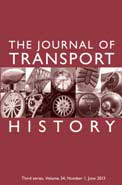 |
|
The Journal of Transport History
No 1, 2013 |
Gordon Pirie:
Editorial: Revolutionary limits in transport
M. Luísa Sousa and Rafael Marques:
Political transitions, value change and motorisation in 1970s Portugal
During the revolutionary period of 1974-76, there was vigorous debate in Portugal regarding the role of automobiles in the desired new society. The dispute was reinforced by the first international oil crisis. Strong ideological rhetoric was deployed either to defend the potentially liberating role of the automobile or to condemn its ‘bourgeois’ underpinnings. This debate influenced social movements, policies, perceptions and views of social actors, thus contributing to market distortions, a short-lived disappearance of luxury and sports cars and to the creation of new models deemed to be adapted to the ‘true’ needs of the Portuguese. It also contributed to changes in automobile assemblage industry, road policy and delays in the implementation of road safety measures. Environmental, safety and traffic concerns were subdued, for a while, by a more essentialist approach to car consumption, with opposing interests trying to define the social spirit of automobile ownership and usage. The political turmoil of the period and the lack of coherent and durable policies account for the period being an intermission and not the beginning of a new trend.
Joseph Boughey:
From transport’s golden ages to an age of tourism: L. T. C. Rolt, waterway revival and railway preservation in Britain, 1944-54
This essay considers L. T. C. Rolt’s writings and work about waterway revival and railway preservation in Britain between 1944 and 1954. Outlining his life up to 1954, the background to his first book Narrow Boat is discussed and set in context, stressing the working lives of people on the narrow English canals. The consequential founding of the Inland Waterways Association in 1946 and its campaigns to protect waterways for pleasure boating are contrasted with limited attempts to support freight carrying. Rolt’s role in the preservation of the narrow gauge Talyllyn Railway in Wales is considered, stressing its difficult reliance upon tourism. The notion of ‘golden ages’ is applied to Rolt’s visions of waterways and railways, set against contradictory historical evidence; problems with his attempts at conservation are stressed. It is concluded that although Rolt was a significant figure, his visions of conservation were unfulfilled. There remains a need to develop conservation history related to transport and to consider the role of the British middle class and manual labour.
Alex Karner:
Multimodal dreamin’: California transportation planning, 1967-77
The California Department of Transportation (Caltrans) replaced the state’s Division of Highways on 1 July 1973. Consistent with the creation of other state departments of transportation throughout the U.S.A. at the time, the enabling legislation envisioned a multimodal agency that would shift transportation policy and planning away from its highway emphasis. Competing conceptions of multimodalism and regional transportation governance advanced by key actors heavily influenced the policies and plans they proposed. Eventually, public and local government opposition to the implementation of multimodal transportation policies diminished the state’s role while elevating the responsibilities of voluntary regional planning agencies. California’s contemporary transportation policy goals remain similar to those that prevailed when Caltrans was created – reducing automobile dependency and promoting compact urban forms – but its transportation institutions were designed precisely to oppose their achievement. Supportive public coalitions now offer the best hope for realizing the state’s multimodal dreams.
Exhibition and museum reviews
Jeff Powell:
(Re)interpreting an Australian horse-drawn vehicle collection
Andrew Piper:
Viewing Norway from the road
Stéphanie Ponsavady:
Yunnan railway museums and exhibits, China
Peter J. Blodgett:
Visions of Empire: the quest for a railroad across America,
1840–80
Reviews
Book reviews
Frances Steel,
Oceania Under Steam: Sea Transport and the Cultures of Colonialism c.1870–1914 (Jonathan Hyslop)
Steve Koerner,
The Strange Death of the British Motorcycle Industry (James Ward)
Frank Steinbeck,
Das Motorrad: Ein deutscher Sonderweg in die automobile
Gesellschaft [The Motorcycle: A German Special Path to an Automobile Society] (Sasha Disko)
Phillip Vannini,
Ferry Tales: Mobility, Place and Time on Canada’s West Coast. (Philip Conkling)
Claire Dobbin,
London Underground Maps: Art, Design and Cartography. (Richard Dennis)
Ray Laurence and David J. Newsome (eds.),
Rome, Ostia, Pompeii: Movement and Space (Dorian Gerhold)
Sibel Zandi-Sayek,
Ottoman Izmir. The Rise of a Cosmopolitan Port, 1840–1880 (Darina Martykánová)
John Laurence Busch
, Steam Coffins: Captain Moses Rogers and the Steamship Savannah Break the Barrier (M. Stephen Salmon)
Ruthy Gertwagen and Elizabeth Jeffreys (eds),
Shipping, Trade and Crusade in the Medieval Mediterranean. Studies in Honour of John Pryor. (Charles D. Stanton)
Philippe Hamman (ed.),
Le Tramway dans la ville, Le projet urbain négocié à l’aune des déplacements [The Tramway in the City: Negotiated Urban Planning in the Light of Movements] (Stéphanie Ponsavady)
Jo Guldi,
Roads to Power: Britain Invents the Infrastructure State. (Geoff Timmins)
Reiner Ruppmann,
Schrittmacher des Autobahnzeitalters. Frankfurt und das Rhein-Main-Gebiet [Pacemaker of the Motorway Age: Frankfurt and the Rhine-Main Region] (Christopher Neumaier)
Kurt C. Schlichting,
Grand Central’s Engineer: William J. Wilgus and the Planning of Modern Manhattan (Sevin Yildiz)
Robert W. Jackson, Highway Under the Hudson: A History of the Holland Tunnel (Sevin Yildiz)
Daniele Marchesini,
L’Italia a quattro ruote – Storia dell’utilitaria [Italy on Four Wheels. History of the Utilitaria] (Massimo Moraglio)
Robert Lee,
Transport: an Australian History (Cameron Gordon)
Christian Henrich-Franke,
Gescheiterte Integration im Vergleich. Der Verkehr – ein Problemsektor gemeinsamer Rechtssetzung im Deutschen Reich (1871–1879) und der Europäischen Wirtschaftsgemeinschaft (1958–1972) [Failed integration in comparison. Transport – a problematic area for common legislation in the German Reich (1871–1879) and the European Economic Community (1958–1972)] (Martin Schiefelbusch)
Paul Mees,
Transport for Suburbia: Beyond the Automobile Age. (Matthias Blondia and Greet De Block)
David Bownes and Oliver Green (eds),
London Transport Posters: A Century of Art and Design (Carlos López Galviz)